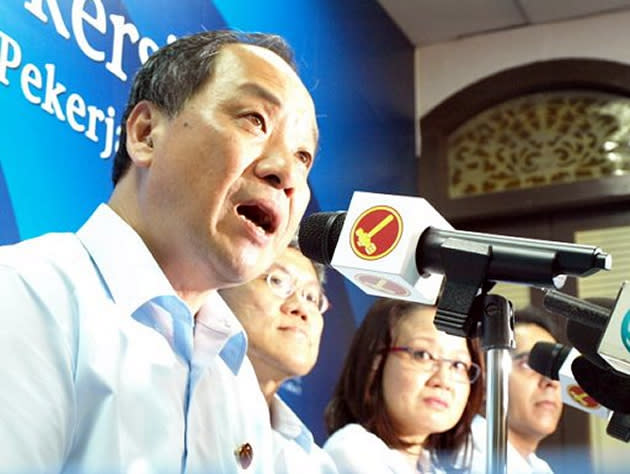S’pore’s opposition shows signs of identity crisis

COMMENT
By P N Balji
Singapore's Opposition leader Low Thia Khiang is one smart cookie. Back in 1991, he caught on to the resentment of residents in Hougang against their ruling party member of parliament and rode into Parliament on the wave of a rare voter backlash.
Twenty years later, in the May 2011 general election, his political antenna picked up the signals of a nation squeezed by a shortage in public housing and an influx of foreigners.
He took a political gamble by moving out of the safe seat of Hougang to fight the neighbouring Group Representative Constituency of Aljunied. It paid off handsomely when he and his team made history as the first opposition party to win in a GRC (group representation constituency).
One year down the road, and the folk hero in that fairy-tale narrative is facing some hard truths.
Low has had to sack his protege, Yaw Shin Leong, for not coming clean on allegations that he had an affair with one of the party's officials.
At least two party officials, one of them the treasurer, quit. Another created a sensation when he carried out an unusual political stunt by collecting the nomination papers for the by-election at Hougang, a seat vacated by Yaw after his sacking.
Is Low's Workers' Party cracking up, as some media reports are suggesting?
Hardly: the cookie is not likely to crumble, not in the immediate future anyway.
First, its popularity seems to be intact. The Hougang by-election saw Low's candidate winning with hardly a dent on the party's majority despite the sitting MP being forced to leave in disgrace.
Second, the party is undergoing what many others have gone through as they try to meet the mood and aspirations of a new generation of voters.
The Workers' Party is a party in transition. Low is bringing in fresh blood, thus upsetting some senior members. Even the ruling People's Action Party has faced such crises off and on, the most sensational case taking place in 1961 when 13 MPs walked out to form the Barisan Sosialis.
A security swoop, Operation Cold Store, took care of that parting of ways. Other PAP dissenters were kept in check by the politics of patronage, a system which allows those who had to give up their party posts to pursue a career in the private sector.
The Workers' Party has neither the power nor the connections to do it the PAP way.
But where Low's political skill is more critical is in the contest of ideas with the ruling party. His party's performance in this area, especially in Parliament, is patchy at best.
Since its stunning performance in last year's election, it has hardly made an impact in Parliament.
On the two major debates (ministerial salaries and the budget), the party either fumbled or didn't bring new ideas to the table.
It is showing signs of an identity crisis, sometimes looking like PAP Lite, and not like a true-blue opposition party seizing the agenda and running with it.
Tapping ground sentiments to win elections is a short-term tactic. If it has ambitions in the middle term of becoming a strong force in Parliament and in the long term of being an alternative to the PAP, a clear differentiation in ideologies and strategies is needed.
Waiting for the PAP to implode is like chasing the rainbow in the sky. You can never catch it!
This post first appeared on the New Straits Times on 20 June 2012.
P N Balji has more than 35 years experience as a journalist. He is now a media consultant.

